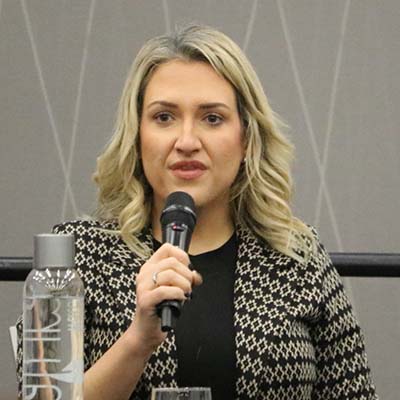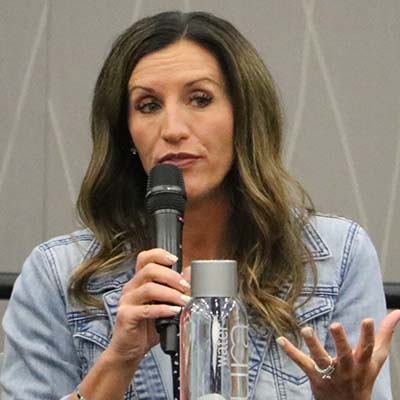Plumbing-Heating-Cooling Contractors’ National Association (PHCC) hosted its PHCCCONNECT2023 event on Oct. 25-27 in Cleveland, bringing plumbing and HVAC contractors together for education, entertainment, and enlightenment. The event featured 20-plus educational sessions; keynote presentations, including coach Ken Carter, inspiration for the 2005 film “Coach Carter,” and Connor Lokar, senior forecaster, ITR Economics; a trade show chock full of new industry innovations; and much more.
One of the highlights of the event was an interactive “Women in Industry” panel discussion in which six tradeswomen discussed their career challenges and experiences.

Lara Beltz, owner, Beltz Home Service Co., Findlay Ohio.

Linda Hudek, owner, LH Plumbing Services, Fairfield, Ohio.

Jacquelyn Lindsey Wynn, senior consultant, Lindsey Brothers Inc., Hampton Roads, Virginia.

Ashley Martin, executive vice president, NIBCO Inc., Elkhart, Indiana.

Cassie Pound, co-owner, Quality Heating, Cooling & Plumbing, Glenpool, Oklahoma.

Angie Snow, principal industry advisor, ServiceTitan.
Attracting Females to the Trade
The roundtable discussion largely focused on the steps plumbing and HVAC leaders can take to attract more women to the trades.
“I did a TED talk in 2017, focusing on the lack of women in the trades, where I asked the question, ‘Why,’” said Susan Frew, co-owner and president, Sunshine Home Services in Denver, who moderated the event. “All these years later, it's still the same; the numbers really haven't changed, but we're working on it. Personally, we've had more female plumbers and HVAC technicians apply in the last year or two, so I think we are really starting to get somewhere.”
Over the years, Cassie Pound, co-owner, Quality Heating, Cooling & Plumbing, Glenpool, Oklahoma, has added a number of women to her staff. When asked how the company was able to accomplish this, her answer was simple: You have to start with one.
“It starts in your backyard,” she said. “Show up to local events and be proactive. Quit calling the receptionist or customer service rep ‘that girl’ or ‘that girl plumber.’ When you start to change the verbiage in your office, everything else follows.”
Angie Snow, principal industry advisor, ServiceTitan, and former owner/vice president, Western Heating and Air Conditioning, Orem, Utah, agreed with Pound, insisting companies must change their cultures when bringing women into a traditionally male-dominated industry.
“The first woman I hired to work in the field received a lot of backlash from the men in our company,” she said. “Unfortunately, her biggest obstacles came from within the company. This was a big red flag. It was something I needed to change — we needed to change. We had to make our culture more welcoming.”
Interaction with Local Schools
The roundtable participants harmoniously stated it’s important for trade companies to foster relationships with their local institutions.
Linda Hudek, owner, LH Plumbing Services, Fairfield, Ohio, said awareness starts during grade school — and not high school but, rather, elementary and middle school.
“You can’t just rely on your trade associations to host events; you need to actually take your company to the local schools,” she said. “Teachers are usually more than willing to welcome speakers in. And when you go, bring your tools and toilets — the kids love it when you do that. This is a great way to truly get them engaged. Especially for girls. I believe 11 years old is kind of the peak of that interest in STEM, and plumbing is STEM. The earlier you can get them to pay attention to the trades, the more likely they are to retain that interest as they continue to grow older.”
Lara Beltz, owner, Beltz Home Service Co., Findlay Ohio, said building relationships with local schools serves as a welcoming pathway for your business as well as the trades.
“In my generation, nobody ever took me aside and said, ‘the trades are for men and women,’” she said. “It’s our responsibility to be the ones who say that to students. By talking to elementary, middle, and high school kids, we’re helping to plant the seeds of change at a young age. My grandfather owned a heating and cooling business, yet no one ever told me I could take it over. Eventually, he died, and then the business completely died. Had someone said something to me when I was a child, maybe that business would still be running today.”
Jacquelyn Lindsey Wynn, senior consultant, Lindsey Brothers Inc., Hampton Roads, Virginia, recalls a time when schools pushed students on a vocational or academic path — and rarely did those journeys intersect.
“Obviously, a lot of students chose the academic track,” she said. “As trades companies, I would suggest hosting an annual event, welcoming people in and out of the trades. This showcases the opportunities available in our industries, which may be attractive to those who are in the process of changing careers, regardless of the path they took back in grade school.”
Don’t Be Exclusionary
While it’s great to advocate for women in the trades, Pound cautioned those in attendance not to be exclusionary in that pursuit.
“When you go into the schools, and you start discussing women’s roles in the trades, please don't exclude the boys,” she said. “Unfortunately, our message has been misinterpreted a little bit. We’ve been put at a little table for a long time — the ‘women in the trades’ table. In this trade, it takes everybody's work and involvement to succeed.”
Ashley Martin, executive vice president, Nibco Inc., Elkhart, Indiana, agreed, saying that increasing the number of women in the trade is not just a female issue — it’s an everybody issue.
“We need the support of men and women to fix this issue,” she said. “This is a problem for the community in general, not just for women. And to that point, when you're putting together job descriptions or job postings, make sure your wording is inclusive for both men and women.”
While the industry is evolving, women in the trades will continue to encounter challenges. In the face of adversity, Beltz encouraged women to remain confident in their talents and abilities.
“Many women question whether they belong in this industry, wondering if they’re worthy of a seat at the table,” she said. “We must realize that, through our work and accomplishments, we’ve earned our spot. It doesn’t matter what anyone else at that table thinks about you; it really only matters what you think about yourself. As a woman, especially if you're new to the industry, you may feel a little bit intimidated. Please know you have just as much business here as anyone else.”








